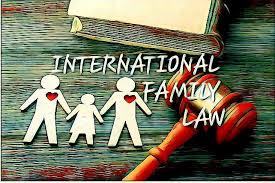


Navigating Cross-Border Family Law Disputes and International Child Abduction in Nigeria
Introduction
Family Law Disputes And Child Abduction;
Cross-border family law disputes and international child abduction are increasingly prevalent issues in today’s globalized world. In Nigeria, these matters are governed by a complex interplay of domestic laws, international treaties, and legal principles aimed at protecting the rights of children and resolving disputes between parents. These issues often arise in cases of divorce, separation, or custody battles involving parents residing in different countries. This article explores the legal framework, challenges, and processes involved in navigating cross-border family law disputes and international child abduction in Nigeria, providing a comprehensive guide for parents, legal practitioners, and affected individuals.
In an increasingly interconnected world, the fabric of family life often transcends national borders. Marriages, parenthood, and relationships frequently involve individuals from different countries, creating a dynamic legal landscape when familial bonds are strained or broken. In this global context, cross-border family law disputes have emerged as a pressing legal and human concern.
The complexities intensify when such disputes involve children, particularly in cases of international child abduction. Nigeria, as a populous and globally active nation, has not been immune to this phenomenon. The legal system in Nigeria continues to grapple with the multifaceted issues that arise when parents from different jurisdictions dispute custody, relocation, or even the wrongful retention or removal of a child across borders.
Cross-border family law disputes can stem from a variety of scenarios—international marriages ending in separation, one parent returning to their country of origin with the child without the other parent’s consent, or situations where foreign custody judgments are brought into Nigeria for recognition and enforcement. These situations pose a wide range of legal challenges, often intersecting private international law, child welfare standards, jurisdictional rules, and procedural questions about enforcement. One of the most contentious and emotionally charged areas in this context is international child abduction—an act that often contravenes the rights of the other parent, disrupts the stability of the child, and violates legal norms.
In Nigeria, the legal framework dealing with these cross-border issues is still evolving. While the country is not yet a signatory to the Hague Convention on the Civil Aspects of International Child Abduction (1980), Nigerian courts have shown a growing inclination to consider the spirit of international norms while balancing them with domestic law and the child’s best interest. However, this lack of formal alignment with international legal standards presents significant obstacles in securing the return of abducted children or enforcing foreign custody orders. Consequently, legal practitioners, judges, and policymakers must engage in delicate legal interpretation to ensure that justice is served without compromising Nigeria’s legal sovereignty or the welfare of the child.
The issue is further complicated by the legal pluralism that characterizes the Nigerian legal system. Nigeria operates a tripartite legal system that includes statutory law, customary law, and Islamic law, each potentially applicable depending on the circumstances of the parties involved. This pluralism often leads to inconsistencies in decisions and poses difficulties in harmonizing cross-border rulings, particularly when a foreign judgment needs to be registered or enforced in Nigeria. Moreover, there is often a tension between respecting the cultural and religious sentiments of the Nigerian populace and adhering to international standards for the protection of children’s rights.
As Nigerian families increasingly find themselves embroiled in legal issues that span continents, the demand for reform and clarity becomes louder. Legal practitioners must not only understand domestic statutes but also be equipped with knowledge of comparative family law, international treaties, and enforcement mechanisms abroad. At the same time, judges and lawmakers must work towards legal reforms that strengthen Nigeria’s capacity to deal with these complex matters efficiently and humanely. The judiciary’s role in promoting international cooperation in child custody matters, particularly in the absence of formal treaty obligations, is therefore crucial.
Another critical area of focus is the psychological and emotional toll these disputes take on children. In most international child abduction cases, the abducting parent is often driven by a genuine belief that they are acting in the child’s best interest. However, the act of unilateral relocation or retention usually deprives the child of meaningful contact with the other parent, disrupts schooling and social stability, and can lead to long-term emotional trauma. The Nigerian legal system, while advancing steadily in child rights jurisprudence, must incorporate a more child-centered approach in cross-border disputes, ensuring that every decision prioritizes the holistic well-being of the child involved.
Furthermore, the role of diplomatic channels and consular services cannot be underestimated. Given the lack of direct treaty obligations under the Hague Convention, Nigerian families often have to rely on informal consular negotiations, intergovernmental cooperation, and diplomatic correspondence to resolve these cases. While these methods may be time-consuming and uncertain, they remain some of the only viable options in the current legal environment. Nonetheless, reliance on such avenues underscores the need for a more robust, transparent, and accessible legal framework.
This article aims to explore these nuances in detail—evaluating the Nigerian legal framework, judicial attitudes, relevant case law, and the broader international perspective. By unpacking the procedural and substantive aspects of cross-border family law disputes and international child abduction, we aim to present a clear, practical, and empathetic guide for families, practitioners, and stakeholders navigating these emotionally charged and legally intricate waters. As we journey through the evolving intersection of domestic and international family law in Nigeria, one central theme must remain clear: the best interests of the child should always take precedence over national boundaries or parental conflicts.
Understanding Cross-Border Family Law Disputes
Cross-border family law disputes involve legal disagreements between family members, typically parents, that cross national boundaries. These disputes often encompass matters such as child custody, maintenance, visitation rights, divorce, and property settlements. With the increasing mobility of families, these disputes have become more complex and require the application of both local and international laws.
Key Legal Framework Governing Cross-Border Family Disputes in Nigeria
- The Child Rights Act 2003: The Child Rights Act, adopted by many states in Nigeria, sets out the rights and welfare of children. It emphasizes the best interest of the child as the primary consideration in all legal matters affecting them, including cross-border disputes.
- The Matrimonial Causes Act 1970: This Act governs divorce, separation, and related matters in Nigeria. It provides guidelines for custody and maintenance decisions but becomes complex when parents reside in different jurisdictions.
- Hague Convention on the Civil Aspects of International Child Abduction: Nigeria is not a signatory to the Hague Convention, which complicates the return of abducted children to their habitual residence. However, principles of the Convention often influence Nigerian courts when dealing with international child abduction cases.
- African Charter on the Rights and Welfare of the Child (ACRWC): This regional instrument, ratified by Nigeria, reinforces the protection of children’s rights across African states. It mandates that state parties prevent child abduction and promote the safe return of children to their homes.
- Extradition Act: Although primarily focused on criminal matters, the Extradition Act may indirectly impact cross-border family disputes where one parent has abducted a child to or from Nigeria.
Common Scenarios in Cross-Border Family Law Disputes
- International Child Custody Disputes: Custody battles can become complex when one parent resides outside Nigeria, and issues of jurisdiction, applicable law, and enforcement of foreign court orders arise.
- Parental Child Abduction: This occurs when one parent unlawfully takes a child across international borders, often in violation of custody agreements or court orders. Nigeria’s non-signatory status to the Hague Convention makes it challenging to resolve these cases swiftly.
- Enforcement of Foreign Judgments: Nigerian courts may be called upon to enforce custody or maintenance orders issued by foreign courts, which involves a legal assessment of whether such judgments align with Nigerian law and public policy.
- Relocation Disputes: Relocation cases occur when one parent seeks to move a child to another country, potentially impacting the existing custody arrangement. These cases require careful balancing of the rights of both parents and the best interest of the child.
Legal Process for Resolving Cross-Border Family Disputes in Nigeria
- Jurisdiction and Choice of Law: Determining which court has jurisdiction is the first critical step. Nigerian courts may assert jurisdiction if the child resides in Nigeria, regardless of the parent’s nationality or residence abroad. The choice of law may involve applying Nigerian law or principles from international conventions and treaties, depending on the specifics of the case.
- Filing for Custody or Maintenance: The parent seeking custody or maintenance files a petition in the appropriate family court. Evidence of the child’s welfare, parental capacity, and living conditions is crucial in these proceedings.
- Enforcement of Foreign Orders: For enforcement of foreign judgments, the Nigerian court examines the order to ensure it is not contrary to Nigerian public policy. The judgment must have been obtained fairly, and the foreign court must have had jurisdiction over the matter.
- Interim Orders and Injunctions: Courts may issue interim orders to prevent one parent from relocating a child abroad or to mandate the immediate return of a child in cases of suspected abduction.
- Mediation and Alternative Dispute Resolution (ADR): Mediation and ADR are encouraged to resolve cross-border disputes amicably. These processes are less adversarial and can provide more flexible and child-focused solutions.
International Child Abduction in Nigeria
International child abduction typically involves a parent taking a child to another country without the consent of the other parent or in violation of a custody agreement. This act not only disrupts the child’s stability but also creates legal complexities that can be difficult to navigate.
Challenges in Addressing International Child Abduction in Nigeria
- Non-Signatory Status to the Hague Convention: Nigeria’s absence from the Hague Convention complicates the swift return of abducted children. The Convention provides an international legal mechanism for the prompt return of children abducted across borders, which is not directly available in Nigeria.
- Jurisdictional Conflicts: Jurisdictional issues arise when parents are from different countries, and courts in multiple jurisdictions may be involved. This can lead to conflicting court orders and confusion.
- Enforcement Difficulties: Enforcing a Nigerian court order in another country, or vice versa, is often fraught with challenges due to differing legal systems, procedures, and cultural attitudes towards child custody.
- Lack of Specialized Legal Framework: Nigeria lacks a comprehensive domestic law specifically addressing international child abduction, which leaves courts to rely on general principles of family law and international conventions to resolve such disputes.
Steps to Take in Cases of International Child Abduction
- Seek Legal Counsel Immediately: Engaging an experienced family law lawyer familiar with cross-border disputes is crucial. They can guide you through the legal process and advise on the best course of action.
- File a Petition in Court: If your child has been abducted, filing a petition in the relevant Nigerian court is the first step. The court may issue an order for the child’s immediate return and can also involve law enforcement agencies if necessary.
- Notify International Authorities: In cases involving other jurisdictions, it is essential to notify the relevant international authorities, such as the police, immigration services, and foreign embassies, to assist in locating the child.
- Engage in Diplomatic Channels: In some cases, diplomatic efforts through the Ministry of Foreign Affairs and Nigerian embassies abroad can be instrumental in negotiating the return of the child.
- Consider Mediation or ADR: Where feasible, mediation can be a less adversarial means of resolving abduction cases, focusing on the child’s best interest and facilitating an amicable resolution.
Challenges and Considerations in Cross-Border Family Disputes
- Cultural and Religious Differences: Cross-border disputes often involve different cultural and religious backgrounds, which can complicate custody decisions and enforcement of court orders.
- Financial Constraints: Pursuing cross-border legal action can be expensive, and parents may face financial challenges in securing adequate representation and attending court proceedings in different countries.
- Emotional Impact on Children: The emotional toll on children caught in cross-border disputes is significant. Courts and parents must prioritize minimizing the psychological impact on the child.
- Language Barriers: Language differences can pose communication challenges in legal proceedings, making it difficult for parties to fully understand and participate in the process.
Best Practices for Parents Involved in Cross-Border Disputes
- Maintain Open Communication: As much as possible, maintain open communication with the other parent to resolve issues amicably and avoid escalating conflicts that can lead to abduction.
- Seek Legal Advice Early: Early consultation with legal experts in both jurisdictions can provide clarity on the legal options available and help avoid costly mistakes.
- Protect Your Legal Rights: Ensure all legal agreements regarding custody, visitation, and maintenance are formalized in writing and, where applicable, registered with relevant courts to facilitate enforcement.
- Plan for Relocation Challenges: If relocation is necessary, obtain legal advice on how to proceed within the bounds of existing custody arrangements to avoid legal complications.
- Stay Informed of International Conventions: Understanding international legal standards, such as those under the Hague Convention, even if not directly applicable, can provide guidance on how courts are likely to approach cross-border disputes.
Conclusion
Navigating cross-border family law disputes and international child abduction in Nigeria is a challenging and emotionally charged process. With the complexities of multiple jurisdictions, cultural considerations, and varying legal frameworks, parents and legal practitioners must be well-prepared to handle these cases. Understanding the legal landscape, taking proactive steps, and seeking expert legal guidance can help protect the rights of all parties involved, particularly the children who are most affected by these disputes.
The legal challenges posed by cross-border family law disputes and international child abduction in Nigeria are far from theoretical—they impact real lives, cause emotional devastation, and often leave vulnerable children in limbo. As families continue to stretch across geographic and cultural boundaries, the Nigerian legal system must find meaningful, practical ways to adapt to these changes. The need for legal clarity, institutional cooperation, and international engagement has never been more urgent. While Nigerian courts have shown commendable discretion in striving to do justice in individual cases, systemic reform is essential if Nigeria is to meet global standards and adequately protect the rights and welfare of children caught in the crossfire of international custody battles.
A core conclusion that emerges from the evaluation of Nigerian legal practice is the inadequacy of current domestic statutes in providing a consistent, enforceable, and internationally respected framework for resolving such disputes. The absence of Nigeria’s ratification of the Hague Convention on International Child Abduction severely limits the country’s ability to reciprocate legal decisions with other nations. This lack of participation in a widely accepted treaty undermines confidence in the Nigerian system’s ability to deal with urgent matters like the return of abducted children. If Nigeria is to be taken seriously as a cooperative partner in international family law, joining the Hague framework should be a policy priority.
Nonetheless, there is room for optimism. Nigerian jurisprudence, particularly in recent decisions involving child custody, has increasingly embraced the “best interests of the child” principle, in line with both domestic constitutional guarantees and international human rights instruments. Courts have begun to adopt a more proactive stance in evaluating foreign custody orders and engaging with the facts and merits of each case, even in the absence of treaty obligations. This indicates a growing maturity in the legal system and provides a valuable foundation for more comprehensive reform. Legislators can build on these judicial trends to formulate clearer statutory provisions, especially on jurisdiction, recognition, and enforcement of foreign judgments.
Furthermore, strengthening the institutional capacity of the courts, training judges in international family law, and developing clear procedural guidelines for cross-border disputes are immediate measures that can make a tangible difference. Legal practitioners, too, must engage in continuous education and collaborate with foreign colleagues to ensure that clients are represented with both legal rigour and cultural sensitivity. Professional associations and NGOs can play a vital role by providing legal aid, facilitating mediation, and advocating for law reform and child protection.
In addition to domestic reforms, Nigeria’s foreign policy and consular relations should evolve to recognize the increasing relevance of cross-border family law disputes. Diplomatic missions abroad should be equipped with legal experts capable of handling family-related emergencies, supporting mediation efforts, and liaising with foreign courts. Bilateral agreements with countries experiencing high levels of familial migration involving Nigerians could also be explored as transitional mechanisms while full treaty integration is pursued.
However, legal reform and institutional restructuring alone cannot resolve the deep human issues underlying cross-border family law disputes. At the heart of many of these cases are parents navigating complex emotional terrain—grief, betrayal, desperation, and sometimes fear. While the legal process must remain objective, the system must also be humane. Mediation, counseling, and psychological support services must be integrated into family law processes to ensure that disputes are resolved not only lawfully, but also compassionately. The future of the child depends not only on legal decisions, but also on the emotional health and cooperation of the parents involved.
In conclusion, Nigeria stands at a legal crossroads. Cross-border family law disputes and international child abduction will only continue to grow as globalization accelerates and more families lead transnational lives. If the legal system fails to evolve, it risks leaving a generation of children without adequate protection and leaving families trapped in jurisdictional uncertainty. However, with strategic legal reforms, international collaboration, and a child-centered approach, Nigeria has the opportunity to become a regional leader in managing these complex disputes.
The task ahead requires determination, cooperation, and vision. It calls for lawmakers who are responsive, judges who are informed, lawyers who are skilled, and parents who are committed to resolving their disputes in the best interests of their children. Most importantly, it demands a legal culture that prioritizes children’s welfare above all else—transcending borders, ideologies, and personal grievances. With sustained effort and compassionate legal practice, Nigeria can indeed provide effective solutions to the growing challenge of cross-border family law disputes and international child abduction.
. Cross-Border Family Law Disputes
. International Child Abduction
. Nigerian Family Law
. Child Custody Disputes
. Enforcement of Foreign Judgments
. Hague Convention
. Parental Child Abduction
. Jurisdiction in Family Law
. Child Rights Act Nigeria
. Mediation in Family Disputes
. Extradition Act Nigeria
. Custody Relocation Disputes
Contact Us
Chaman Law Firm today. Our offices are conveniently located in Lagos, FCT Abuja, Ogun State, and the UK. We are readily available to assist you with your legal needs. Whether you require consultation, representation, or ongoing legal support, Chaman Law Firm is your trusted partner.
Call us at 08065553671 or email us at info@chamanlawfirm.com to schedule a consultation.


